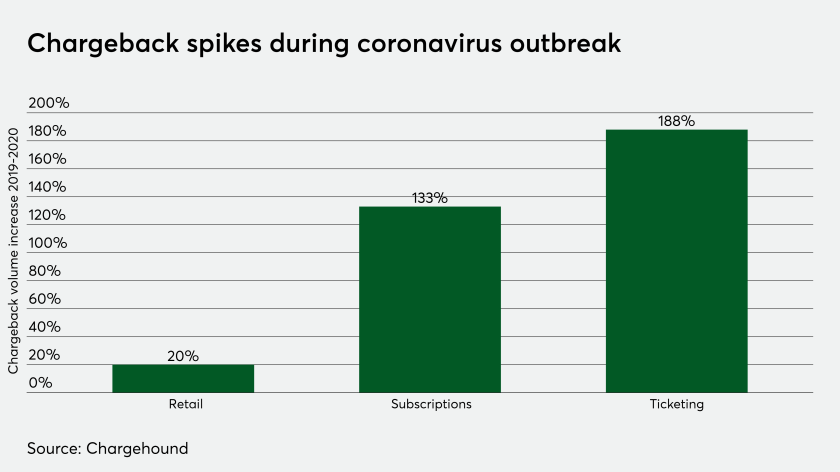As credit card chargebacks accumulate during the coronavirus crisis from consumers seeking reimbursement for canceled trips and events, PayPal is extending an olive branch to merchants.
PayPal on Wednesday began rolling out a service enabling merchants to automatically respond to any customer disputes about PayPal purchases using technology from Chargehound, an Oakland, Calif.-based startup the payments technology giant invested in last year.
Chargehound’s API-based platform pulls data and evidence about a disputed transaction from a merchant’s payment processor and automatically submits responses to the parties, said Chargehound CEO Adrian Sanders.
Merchants opt in to the service through PayPal, and for every transaction dispute Chargehound wins, it keeps a portion as its fee.
Chargehound’s analysis process takes a few seconds, versus the typical chargeback process that can take anywhere from hours to weeks, where merchants manually review the details of disputed transactions before submitting case files to issuers to determine liability, according to Sanders.
Key to Chargehound’s ability to analyze chargeback details in seconds is its close integration with PayPal and its subsidiary Braintree, along with Stripe and Vantiv.

“Connecting through modernized APIs with our partners, we can move information very quickly and accurately through the chargeback process, versus the traditional approach where merchants have teams of people cutting and pasting transaction details into a file,” Sanders said.
Though PayPal had already planned to announce an integration with Chargehound this year, the timing of the rollout during the coronavirus pandemic should be advantageous, Sanders said.
Currently a record number of consumers are seeking refunds from airlines, cruise and hotel operators and other ticket-sellers for pandemic-related cancellations. In some disputes, customers get their money back, whereas others are denied or delayed due to merchants’ terms of service. If a provider denies a refund, the consumer then requests a chargeback from their card issuer.
Chargehound’s data suggests chargebacks on event tickets rose 188% from March 2019 to March 2020, while subscription chargebacks rose 133% and routine retail chargebacks rose 22%.
Chargehound quickly researches each case using troves of available data and submits the results to issuers for resolution on behalf of participating merchants.
Many disputed transactions involve “friendly fraud,” where consumers want to reverse a legitimate transaction because they changed their mind, and in other cases the problem stems from a delivery error.
“There are a lot of simple mixups that can be resolved easily with information we can quickly glean, but there's a chargeback process to try to get a refund. Our process sorts out what happened and sends it on to the issuer to determine who pays,” Sanders said.
Internet services protection firm NetProtect said that since it began using Chargehound, it's won 20% more of disputes customers initiated, recovering 45% of revenue it would have otherwise lost.
For PayPal, which hasn’t always had an outstanding record in customer service and returns, streamlining disputes should be a big step forward, Sanders said.
“I had bad experiences with PayPal in the past, but the company has changed a lot, and improving chargebacks with digital technology is something PayPal has wanted for a long time,” he said.
PayPal invested an undisclosed amount in Chargehound last year, five years after the company launched in 2014.
Sanders and his associates stumbled onto the idea for Chargehound after running into chargeback problems with Beacon, a publishing startup that relied on crowdfunding.
“Our business model was based on getting paid for quality journalism but we had so many chargebacks we started looking at technology to solve that problem, which became the idea for a different company,” Sanders said.
After applying for funding from Y Combinator, Chargehound began building technology to resolve chargebacks, going live with its services in 2016.
Chargehound focuses primarily on e-commerce chargebacks, but it has also covered some point-of-sale disputes for omnichannel merchants.
“The fact that we’re seeing a spike in disputes while merchants have been hammered by coronavirus has turned out to be great timing,” Sanders said.
